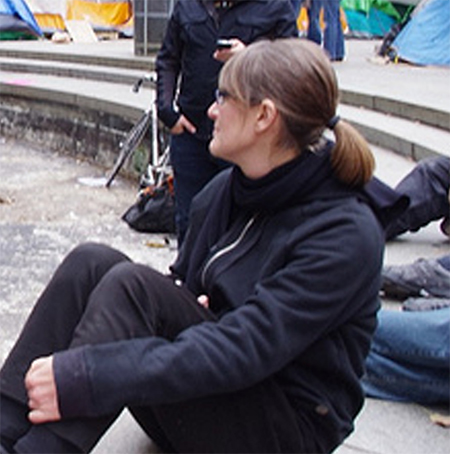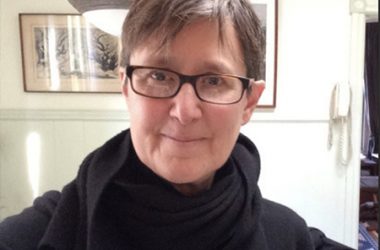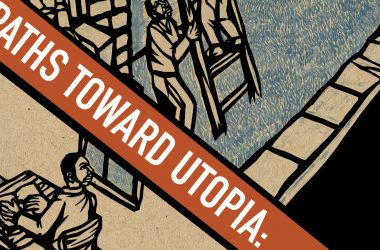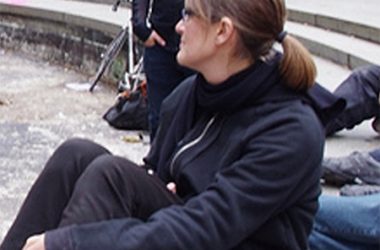
This image, copied on to an 8.5 x 11 piece of paper, now wrinkled and worn, has been tacked up in my collective home’s bathroom for, likely, years now. So I’ve come to barely notice it anymore — until a few days ago, when it jumped out at me anew, refreshed by the rising up across the United States. Ferguson, for all the hardship and indignity people endure there on a daily basis, showed the rest of us what neighbors can do.
It doesn’t mean that all neighbors like each other.
In fact, a recent visitor from Ferguson to Oakland who I met on the stolen land now named OGP told me that there have been more murders between people in that part of St. Louis since Mike Brown was murdered by cops. There was already, he told me, a “culture of revenge” in which folks have long held deep and too-often deadly rivalries among themselves, largely due to white supremacist divisions and capitalist-fueled suffering. Once on the streets together night after night, after Mike Brown was left to lie there surrounded by police, tensions flared. Still, he explained, everyone knows who the real enemy is — the cops — and precisely because of that “culture of revenge,” neighbors aren’t as scared of police as in other places. Neighbors in Ferguson, even those who don’t get along, know not to talk to police; they know to talk to each other, to resist together, to envision some sort of humane neighborhood instead.
Here in the Bay Area, after over three weeks of many days and nights on the streets, I’ve seen my own unneighborly guard being let down. I’ve had the chance to talk to so many people who inhabit this big neighborhood of resistance that still characterizes San Francisco, Oakland, and Berkeley, despite high-tech capital’s effort to displace us. A far portion of them have been people who I’ve had attitudes about or been dismissive of, or just never made the effort to talk to — political and geographic neighbors, all. And it’s been the most heartening, hopeful part of being on the streets. It made me re-see this tattered poster in my collective home’s bathroom, through new neighborly eyes that have, in turn, increasingly made me see all the new bonds that we are creating in real time, real life.
So it’s pretty much all I want to do now: talk to neighbors. Because when I — when we — do that, we remember which side of history we’re on, and with whom, and how that has to be a project of togetherness.
We are reminded, time and again, of our ethical sense, and how we collectively, as neighbors, are the keepers of that compass. We remember that the big, broad “we” who are neighbors, for all our differences and squabbles, for all the ways we actually are able to get along and rely on each other, too, are the ones who will give us and others our freedom.
It’s a freedom that looks a whole lot like “strong communities make police obsolete”; autonomous and interdependent communities of care; neighborhoods where we know our neighbors, and aren’t forced out by foreclosures, rent hikes, evictions, and all the racialized dispossession (yet again) of land and liberty; face-to-face relations that involve us tending to each other in all sorts of mutual, loving ways, big and small.
Or small ways that are huge.
One example that feels particularly poignant to me is how folks, neighbors new and old, are striving to (re-)create networks that will pay for the funerals and flowers for those murdered by cops, and variously support the families, almost all black and brown, who have had loved ones’ lives stolen by the hands and guns of police, not to mention other state violence. We shouldn’t have to do this. But until we don’t have to, such disruptions of white supremacy and eruptions of compassionate neighborliness are experiments laden with possibility, with empathy. They are us rearranging the world.
“Nobody in the world, nobody in history, has ever gotten their freedom by appealing to the moral sense of the people who were oppressing them” (Assata Shakur).




